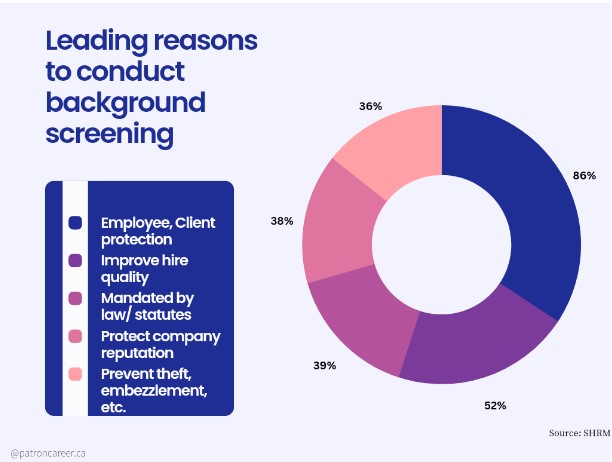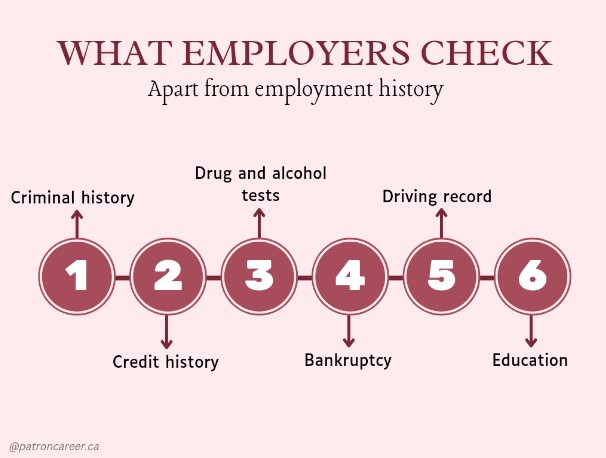
What Are Staffing Agencies
13 November, 2022
Patron Career Staffing firmly believes in adopting a tailored approach to meet temporary and permanent recruitment needs. We safeguard the interest of our clients by finding such workers who are knowledgeable and reliable.
About UsNeed help? Make a Call
32 Dundas Street East Unit A, L5A1W2

It is only so convenient for employers to conduct background checks on their prospective employees to avoid the chances of job fraud. It is an essential part of the recruitment and hiring process for it helps employers in selecting the right fit for their organization.
Since a bad hiring decision equates to a potential failure of an organization, as an employer you do want to ensure what you are up for years to come and how it's going to affect your workplace morale, clients, and organization as a whole.
We have compiled 8 do's and don'ts of conducting background checks on employees to help you find answers to all your last-minute concerns!
A legal fact-finding review of a person’s history is known as a background check. Many employers conduct background checks on job candidates to verify their employment, commercial, financial, and education activities in the past. Such screening initiatives save time and money for employers further down the line. Background checks can give a crucial opportunity to verify a candidate for someone who they are claiming to be. It is of utmost importance, that authentication and validation of a person’s degrees, proficiency, and history be made to lower risk and improve the quality of hires. It must be conducted within the legal parameters and all rules should be complied with before proceeding.
The topmost reason behind this travail of conducting background checks is to dodge job
frauds which have become quite prevalent in the competitive job-hunting market. A
thumping 53% of applicant resumes include at least one lie or inaccuracy about their
past experience, education, etc. Employers should never take a person in only based
on their flattering words or a sheet of resume. Pre-employment background screening
allows you to make intelligent hiring decisions that benefit your goodwill, and your
clients and especially prevents and reduces chances of misappropriation, theft, and
other criminal activity.

So remember to not just throw away jobs to candidates without performing employee background verification to mitigate any future risks and frauds.
If an employer decides to conduct a background check on you, they are potentially going to check your work and employment history, social security number, criminal records, court records, bankruptcy, etc.

They might also make a thorough check on your behavior history, incidents of sexual harassment at the workplace, drug and alcohol tests, military records, references, property ownership, vehicle registration, residential address, and so on.
The above screening touchstones will vary depending on what industry you're applying for.
The practice of performing a background verification on a prospective employee is so important that nearly a whopping 94% of employers rely on background checks alone, according to the reports of the Professional Background Screening Association (PBSA).
There are complex challenges of talent management decisions that are associated with pre-employment background checks. We have made that bit easier for you by jotting down some essential do’s and don'ts when it comes to protecting your business against bad hires.
1. Do obtain consent
The best advice we can offer you in the first place is to obtain applicant consent. Tell them why your organization is doing so, and inform them about how extensive it is going to be. You do not want to bend any associated law, so it is best to first make the candidate aware of any checks on them and make sure to get that in writing.
2. Don’t infringe candidate’s privacy
You should know exactly what you're looking for before conducting background verification for any current or prospective employee. Transparency must be established erstwhile because it is a two-way street. The taboo topics in a job interview must be discarded because they are irrelevant and do not serve any purpose to confirm a candidate's potential.
3. Do reveal results
Often, when hiring managers fail to give a good reasonable explanation to the candidates for rejecting them, it affects them negatively and has a bearing on the organization's goodwill as well! If you happen to find any issues that might impact your assessment, share and discuss it with the applicant himself. Usually, candidates offer you a pretty good explanation to clear out any misconceptions, errors, or mistakes- only if you engage in face-to-face communication with them.
4. Don’t rely on the applicant's social media
Mind you there is a difference between personality and job performance. What you see on the internet- networking skills, leadership enthusiasts, or contradicting behavior patterns and red flags, might not help you make a proper hiring decision. This is because people are habitual in creating fake online profiles all the time and falsifying information. Social media background checks are all considered an invasion of privacy and don’t reveal professional information to use in making a hiring decision.
5. Do create a written screening policy
Make sure that you have a screening policy that is well-written. This presents companies from lawsuits and gives applicants all the necessary information related to the job at hand. Even so, with a verification program in hand, you happen to level the playing field for candidates applying for the same job title and avoid charges of discrimination.
6. Don’t establish a blanket policy
Avoid any vague and abstract policy on employee verification. Simply avoid bright-line policies, such as any ‘ban the box’ criteria for hiring people with a criminal background. You should be open-minded about the applicant’s criminal history because not all convictions carry the same weight.
7. Do follow the law
By complying with applicable local, federal, and state employment laws, you’ll essentially protect your company from any legal issues. Non-observance of legal processes and statutes may land your organization in serious trouble.
8. Don’t be myopic
Your hiring process is only as good as your recruiter's. You require someone who is farsighted and considerate and with the ability to make informed hiring decisions about new employees. Their focus should be on obtaining a holistic view of a candidate without showing favoritism or discrimination.
The bedrock of employee background verification and screening is doing it the right way and yielding an amazing and productive workforce for your company's endeavors.
Final words
Are you worried about finding work? Search tons of job titles and offers on Patron Career Staffing Solutions and show employers what you’re made of.
